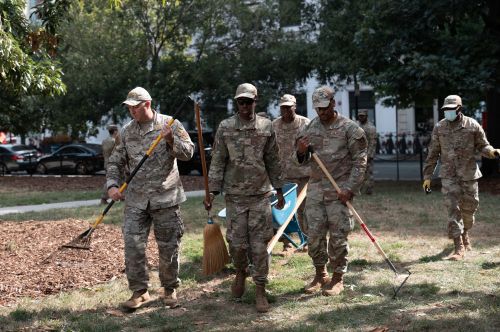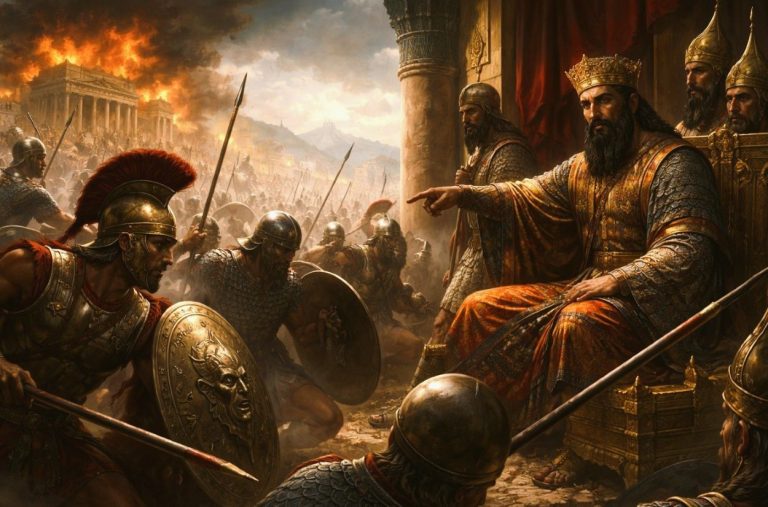

The deployment of the National Guard to Washington is less a security measure than a performance. It reflects Trump’s effort to project strength at a time of political weakness.

By Matthew A. McIntosh
Public Historian
Brewminate
A Deployment without a Mission
On the streets of Washington, D.C., National Guard troops can now be spotted in uniform, but their activities look less like security operations and more like community chores. They rake leaves in public parks, collect trash near government buildings, and sweep sidewalks. In some neighborhoods, they have been seen cleaning debris from homeless encampments, carefully avoiding any direct contact with residents. Asked by curious citizens what their assignment entails, several have replied with disarming candor: “We’re just walking around.”
The unusual spectacle follows President Trump’s decision to deploy the Guard to the nation’s capital alongside his broader push to federalize local policing. The official rationale is public safety, but the soldiers themselves admit confusion. Many report they have received little guidance beyond maintaining presence. Their posture is neither aggressive nor law enforcement oriented. Instead, they are filling time with busywork that has little to do with crime control.
Posse Comitatus and the Limits of Power
The military’s restraint is not accidental. The Posse Comitatus Act of 1878 restricts the use of federal troops in civilian law enforcement. Although the National Guard can be mobilized under a governor’s control for domestic emergencies, its deployment by a president under federal authority carries sharper limits. For now, commanders appear intent on observing those boundaries.
That adherence produces a strange tension. Trump has signaled a willingness to use federal power against local crime, but the Guard cannot legally assume the role of police officers. The result is a deployment that looks ceremonial, even performative. Troops remain visible, signaling federal strength, yet their hands are tied. They rake leaves instead of making arrests. They clear trash instead of patrolling streets.
A Political Stunt in Uniform
Critics across the political spectrum see the deployment as a stunt. Local officials in Washington point out that crime trends, while serious, fall within the city’s authority to manage. They describe the Guard’s presence as an intrusion into local governance and a symbolic flex designed to show voters that Trump is taking decisive action.
The soldiers themselves reinforce this impression. Interviews conducted by reporters from The Washington Post and other outlets reveal confusion within the ranks. One Guardsman admitted he had no idea what the mission objectives were, noting that leadership had simply told them to “be present.” Others expressed frustration at being pulled from regular duties in their home states to sweep sidewalks in the capital.
For Trump, however, presence is the point. The optics of soldiers in fatigues against the backdrop of the Capitol and the White House feed his narrative of authority. Even if they do little, they look like guardians of order, a message he has been eager to amplify as his approval ratings sag.
Cultural Memories and Civilian Perceptions
The deployment taps into older cultural memories of soldiers stationed in civilian spaces. In American history, military presence in the streets has often signaled moments of crisis, from desegregation conflicts in the 1950s to Vietnam-era protests. Yet in those cases, troops were engaged in direct confrontations. The current deployment feels hollow by comparison, producing more bemusement than fear.
Residents of the city have taken to social media with photos of Guardsmen picking up litter and sweeping sidewalks, sometimes captioning them with irony. “Our protectors at work,” one tweet read, showing soldiers stacking trash bags near a Metro station. For some, the sight is reassuring, evidence that the military is keeping to a light footprint. For others, it underscores the absurdity of deploying troops with no clear mandate.
The Question of Federalization
Trump’s move to federalize policing in Washington fits within a broader pattern. His administration has sought to assert federal authority over local law enforcement, arguing that urban leaders cannot control crime. Yet the Guard’s current behavior suggests that even federal muscle has limits when confronted with the constraints of law and tradition.
The paradox is striking. The President commands one of the most powerful military forces in the world, but in Washington his troops are left raking leaves. The gesture is political theater more than practical policing. It allows Trump to claim action without breaching legal boundaries that would trigger deeper backlash.
Conclusion: A Performance of Power
The deployment of the National Guard to Washington is less a security measure than a performance. It reflects Trump’s effort to project strength at a time of political weakness, while staying just inside the lines drawn by Posse Comitatus. Soldiers with rakes and trash bags are not an answer to crime in the capital. They are symbols in uniform, stagehands in a political production that seeks to reassure some and provoke others.
The real question is whether such stunts can sustain credibility. Citizens see through theater when it grows too transparent. For the Guard, the embarrassment of a mission without purpose may linger long after the leaves are cleared. And for the city itself, the lesson is sobering: federal authority, once deployed, rarely withdraws quietly, no matter how absurd the role it plays in public view.
Originally published by Brewminate, 09.02.2025, under the terms of a Creative Commons Attribution-NonCommercial-NoDerivatives 4.0 International license.


